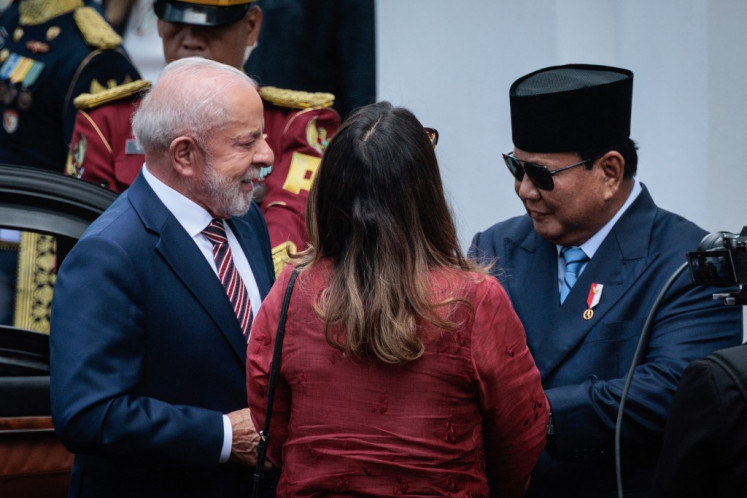Popular Reads
Top Results
Can't find what you're looking for?
View all search resultsPopular Reads
Top Results
Can't find what you're looking for?
View all search resultsEnglish no burden for Jakarta schoolkids
Fifth grader Khairunisa timidly shares her interest in the English lesson she gets once a week for two hours in her class
Change text size
Gift Premium Articles
to Anyone
F
ifth grader Khairunisa timidly shares her interest in the English lesson she gets once a week for two hours in her class.
“I have learned about time, how to greet people, and making simple sentences using ‘there is’ or ‘there are’,” the student of SD Bendungan Hilir 02 in Central Jakarta said.
Ninis, as her friends call her, has been learning English since she was in first grade. Although she and her friends rarely speak in English, she always enjoys her time studying English in class. And when she hears English words on television, she never hesitates to ask her teacher the following day. “I like it. I think it’s easy,” she said.
On the other hand, 11-year-old Mariska Putri, from the same school, said that she did not like English as much as Ninis, as she found that some parts were pretty hard for her to follow. “I like English, but sometimes I find it hard to pronounce words in English,” she said.
Unlike decades ago, students nowadays study English from elementary school. Some have even been introduced to it in kindergarten. As an international language, English is seen as important, especially when technology is bringing globalization to almost every corner of the world.
English teachers are therefore baffled by the government’s plan to scrap English from the national curriculum for elementary schools.
Sri Famili, an English teacher at SD Bendungan Hilir, said that she was surprised by the plan. “I don’t know why the government wants to scrap it. It’s not like the materials we have in class are complicated,” she said. She added that all materials were all delivered according to students’ capability in their own levels.
At her school, she said, students actively participated in English class. She added that it was easy to teach them as they could easily absorb the materials.
To help students become more fluent in English, every Tuesday the school holds an English Day. Students gather in the schoolyard before going into the class to participate in group activities for half an hour using English.
“We want the students to get used to it because everything now uses English. We don’t want them to be left behind,” she said.
Another teacher from SD Pal-merah 12 in West Jakarta said that she would prefer it if the government kept English in the curriculum. “The government says that they want students to master their mother language first. But I think they can work together,” said the teacher who declined to be named.
But if the government insisted on the policy, she hoped it would apply only from first through to third grade, not completely. “It will give them basics when they enter junior high school later,” she said.
Deputy Education and Culture Minister Musliar Kasim said that the government was set to drop English from the elementary school curriculum nationwide next year, especially in all public schools. But the government has yet to decide what to do with international schools that typically use English as their main language of instruction.
The policy aims to give enough time for students to master the Indonesian language first before learning foreign languages. “But we can’t know for sure whether students’ Indonesian will improve when English has been omitted,” Sri said.
Many parents have also decided to enroll their kids in private lessons at training centers to master the international language if English is no longer to be in the curriculum.
Besides dropping English as a subject, the ministry also plans to trim the existing primary school subjects to six, namely religion, Indonesian, civics, arts and skills, physical education and general knowledge. The subjects to be trimmed include math, science, social studies, local content and self -development.










